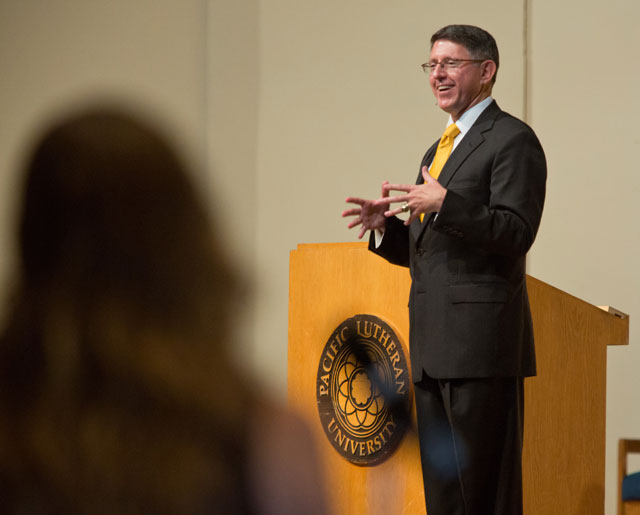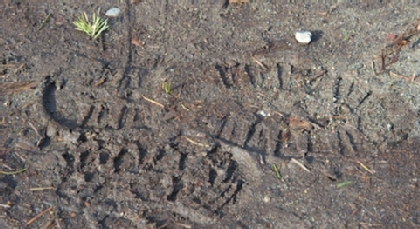Page 50 • (1,313 results in 0.075 seconds)
-

academic year. It’s distinctive to PLU and characteristic of our collaborative, generous, and spirited culture. That culture is a product of all of the diversity of talents in this room. It takes a wide variety of skills, abilities, outlooks, and world views to create the PLU experience for our students. Everyone in this room is a key player—the facilities and grounds keeping teams are the Department of First Impressions and they help us all have a magnificent and beautiful campus on which to work; our
-
sanctity (holy persons, sites, and relics); the development of ascetic behavior for monastics and laity; the relationship between Christians and diverse political systems; and the role of Christianity in the development of western culture. (4) RELI 224 : Always Reforming: The Lutheran Heritage - RL, VW This course is an introduction to the central insights, historical development, and formative practices of Lutheran Christianity. Through engaging texts from the sixteenth century to today, we will
-
: teaching, advising, mentoring, research, and service.More InformationKHP Regency AwardsThe Karen Hille Phillips Regency Advancement Awards are intended to enhance opportunities for the professional development of the university’s faculty.More InformationHarstad GrantThe Harstad Endowed Curricular Development Grants are intended to fund the development of curricula that highlight the culture, values, intellectual contributions, and history of Scandinavia.More InformationWang Center Research GrantsThe
-
and relationally are impacted by our culture, race, ethnicity, family of origin, and sexual identities. Debbie is passionate about helping couples and families get “unstuck” in patterns that are not serving them. Her background includes working with at-risk teens as well as people who have experienced injuries on-the-job within Washington’s worker’s compensation system. She understands the complex impact of work interruptions and health crises on individuals and their families. With all clients
-

member of the Takama Nation, and founding director of the Center for Native Health and Culture at Heritage University. *Note: All comments are moderated Read Previous Tacoma Immersion Experience Semester discontinued Read Next Student opportunity to visit Amazon HQ in Seattle LATEST POSTS Intersections: Called and Empowered (and Assessed) April 29, 2022 Intersections: Called to Place November 10, 2021 Intersections: Learning Love of Neighbor May 3, 2021 Intersections: The Tradition’s Wisdom in a Time
-
by Prof. Halvorson. Dr. Liu’s lecture explored the legacy of Adam Smith in the United States and the influence of Smith’s ideas in American thought, politics, and culture. The talk related to Liu’s recent book Adam Smith’s America: How a Scottish Philosopher became an Icon of American Capitalism (Princeton, 2022). To watch the lecture in its entirety, please click this link. Feel free to use the resource in your own programming and teaching. For questions about usage and appropriate citation for
-

learning opportunities. Site visits will include internationally significant collections like Oxford’s Ashmolean Museum and the British Museum in London. Additional short trips will focus on the interpretation of landscape as history at Stonehenge, and on the representation of national culture at the National Museums in Cardiff, Wales. Professor of Art & Design and Chair of the department, Heather Mathews, leads the course. Students will have the opportunity to see art in person that has been
-
3. A liberating foundation in the liberal artsThe roots of the liberal arts (artes liberales) extend back into classical antiquity. Roman education, for example, progressed from basic literacy (the province of the litterator), to secondary school under the grammaticus, and finally to rhetorical education with the rhetor. Rhetoric allowed for a career in public office or the law courts. The achievements of Greco-Roman culture were eclipsed in the West for some centuries after the fall of Rome
-
orthodoxy contributed to the Thirty Years’ War; the free thinking of German Lutheran professors had little impact upon Prussian militarism; Lutheran culture contributed to political quietism during the Nazi period. At the same time, Lutheran colleges established by immigrants in the United States came to inherit more fully the freedom of inquiry that was the birthright of the European universities and Lutheran higher education. The Lutheran intellectual tradition, consequently, has lent a highly
-

reinforces the dedication of the entire campus community to reaching the goal of being carbon neutral by 2020.” It’s not only a follow-up to signing the Climate Commitment two years ago, it’s a road map to a future of being a carbon neutral university by 2020, said PLU Sustainability Coordinator Chrissy Cooley. “PLU took it one-step further,” she said. “The whole university really wants sustainability to be integrated into campus culture.” The comprehensive green plan defines what PLU’s carbon footprint
Do you have any feedback for us? If so, feel free to use our Feedback Form.


